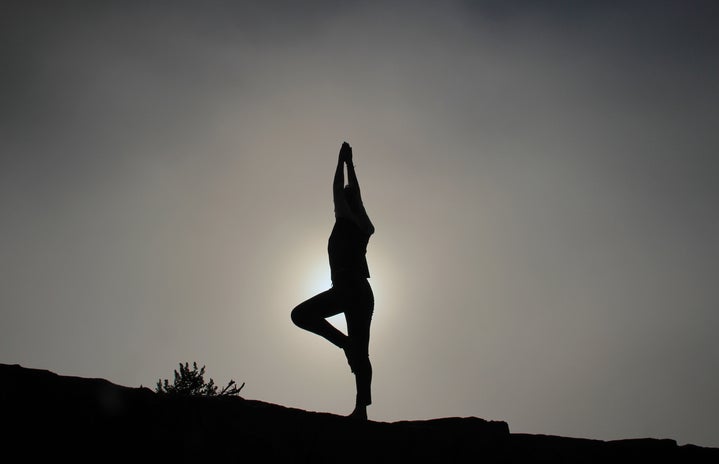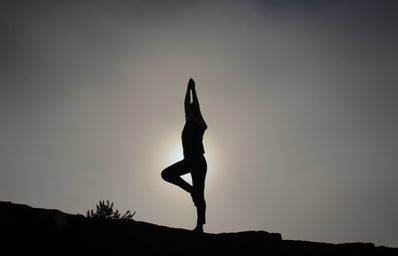We all need a little boost from time to time to get us through our busy college days. For some, a sweet treat or a yoga class does the trick, but many of us collegiettes turn to caffeine for a daily pick-me-up. You’ve probably heard a lot of contradicting rumors about your go-to beverage, but how bad is your caffeine habit actually? We got the lowdown on caffeinated drinks and how to ditch them.
Here’s the thing: Caffeine is not always that bad. According to online nutritionist Mary Hartley, RD, only high doses of caffeine will have a negative impact on your health, and black coffee itself actually contains beneficial antioxidants. The main problem with other caffeinated beverages like mixed coffee drinks is their high sugar and/or fat content.
On the other hand, excessive caffeine intake is very harmful, and we’re not always aware of how much of it we’re actually consuming.
The problem with caffeine
1. It can cause dependence
Many of us are dependent on coffee. “Being a full-time student, life would be impossible without caffeine,” says Hana Ah You, a senior at the University of Hawaii. “I am not a morning person, but once I have a coffee in hand, I genuinely enjoy waking up.”
If this sounds familiar, you don’t need to worry too much. “Caffeine can cause a dependence, but it is not chemically addictive per se,” Hartley explains. “It doesn’t meet the criteria [for addiction](as defined by the Diagnostic and Statistical Manual of Mental Disorders (DSM)).”
Addictive behavior is maladaptive – meaning it hurts your everyday life – whereas your caffeine habit tends to help you get through your day. So yes, you can miss your morning coffee or your lunchtime Coke if you don’t have it, but this does not constitute an addiction in and of itself. “You don’t get a high from coffee and soda, just pleasure,” Hartley says.
With that in mind, being dependent on anything is never a good idea, and excessive caffeine consumption can be extremely harmful.
2. It can cause intoxication
Caffeine intoxication is a serious consequence of consuming more caffeine than your body can tolerate. According to Hartley, the human tolerance to caffeine is between 400 and 1,200 milligrams per day and varies from person to person. “For example, a 5-hour ENERGY shot contains 100 mg of caffeine per fluid ounce. At Starbucks, the caffeine content of a brewed coffee is 180 mg in a Short (8 ounces), 260 mg in a Tall (12 ounces), 330 mg in a Grande (16 ounces) and 415 mg in a Venti (20 ounces),” Hartley says.
There are many symptoms of caffeine intoxication, including restlessness, insomnia, excitement, urinating more than usual, digestion problems, muscle twitching, sweating, diarrhea and increased heart rate. These symptoms are unpleasant, potentially dangerous and a sure sign that you need to reduce your caffeine intake.
3. It can cause anxiety and sleep disorders
You might know from experience that caffeine affects your sleep and gives you the jitters. “Anxiety and insomnia are the most common short-term side effects of excessive caffeine consumption,” Hartley says.
In medical terms, “caffeine blocks the brain chemical adenosine, which plays an important role in the body’s sleep system,” says Michael A. Grandner, an instructor of psychiatry and member of the Center for Sleep and Circadian Neurobiology at the University of Pennsylvania. “By blocking adenosine, it makes it more difficult for the body to feel sleepy.”
It’s hard enough as it is to get the rest you need in college, but caffeine disrupts your sleep schedule even more. “Caffeine can stay in your system for several hours,” Dr. Grandner says. “You definitely want to avoid caffeine within four to six hours of when you intend to sleep. And for some people who are sensitive, this can be more like 10-12 hours.”
Don’t let your favorite caffeinated beverage keep you from falling asleep; listen to your body and don’t exceed your limit.
4. It could play a role in miscarriages
Excessive caffeine consumption is likely to hurt you a lot more in the long run. According to Hartley, “the long-term side effects of caffeine have not been confirmed, but excessive caffeine intake might play a role in miscarriages.” The threat of losing a baby alone might incite you to reconsider that third cup of coffee.
5. Caffeine and alcohol are a dangerous mix
We all know that too much alcohol is a bad idea, but what about mixing caffeine with alcohol? When we go out after a long school day, we’re often tempted to down a latte or an energy drink to get us pumped up without considering the consequences.
“This combination can lead to more risky and dangerous behavior,” Dr. Grandner says. “The alcohol leads to a lack of inhibitions and poor judgment, and the caffeine gives you more energy to actually do those things.”
6. There are withdrawal symptoms associated with quitting caffeine
Because caffeine causes dependence, there are consequences for quitting. “The withdrawal syndrome is comprised of headache, fatigue, dysphoric mood, difficulty concentrating and flu-like somatic symptoms,” Hartley says.
Rachel Petty, a sophomore at James Madison University, regularly experiences caffeine withdrawals. “If I don’t have coffee in the morning or soda throughout the day, I get headaches,” Rachel says. “I’ve stopped drinking coffee for a little while but I always go back to it, and I don’t think I’d ever be able to give up diet soda!”
How to kick your caffeine habit
1. Cut down gradually
If you try to quit caffeine all at once, you’ll likely experience withdrawals and soon pick up the habit again. This happened to Sarah Khalid, a sophomore at the University of Ottawa.
“I tried to cut iced coffee and soda cold turkey and got the worst withdrawal headaches,” Sarah says. “I ended up just going back to it. Caffeine makes me feel alert and makes me more productive. However, I should probably slowly cut down instead of going cold turkey, because cutting caffeine is painful!”
Sarah has the right idea. “If you’re getting too jumpy, just drink fewer cups or stop at noon,” Hartley advises. “To lessen symptom severity, cut down on caffeine gradually over several weeks. Watch out for hidden sources of caffeine in soda, tea and medicines, because they prolong the withdrawal process.”
Another way to cut down your caffeine intake if you’re a coffee drinker is to switch to a weaker brew or make your favorite beverage decaf instead.
2. Don’t drink caffeinated drinks when you have a quiet day
Since a lot of us use caffeine to get through busy days, it makes sense to avoid it when you’re just staying home or kicking back. “Drop your intake to zero at a time when you don’t have to be especially alert,” Hartley says.
Allison Chen, a sophomore at the University of California, Santa Barbara, only drinks iced coffee when she really feels the need to. “The other day, I drank an iced coffee that got me through my morning classes, my usual food coma during my post-lunch afternoon classes, biking around campus twice to get from place to place and run errands, go to the gym AND visit a friend on the other side of town,” Allison says.
On that day, Allison most probably needed extra energy, so she turned to her favorite caffeinated drink. On days when she doesn’t have such a busy schedule, Allison stays away from caffeine.
3. Know how much is too much
As long as you stick to recommended doses of caffeine – roughly two to three 10-ounce cups of coffee per day—you shouldn’t experience any significant problems. “The issue with caffeine is the dose,” Dr. Grandner says. “Everybody is different. Regarding dose, about 1 mg per pound of body weight should be enough to get most or all of the benefit you are likely to see, though you may require much less to get a noticeable effect.”
Be aware of how much caffeine you are actually taking in, including from soda, chocolate and medication. Always stop if you start to experience any of the symptoms of caffeine intoxication.
4. Replace caffeine with other healthier habits
Although Hartley does not discourage moderate caffeine consumption, she sees caffeinated beverages as “a missed opportunity, nutrition-wise.” The way she sees it, “Whenever caffeinated soda or a cup of coffee displaces a glass of milk, the body is deprived of calcium, vitamin D, phosphorus, potassium, B-vitamins and other nutrients.” So whenever possible, turn to a glass of milk or a pressed juice. This will give your body proper nutrition besides the antioxidants found in coffee and will reduce your chances of caffeine intoxication.
If you drink coffee or soda because you find water boring, try chamomile tea or fruit-infused water instead.
If you find yourself needing the boost you get from coffee, there are plenty of things you can do to feel more energized. Try going for a run, for instance, like Gülnaz Kiper, a junior at the University of California, Los Angeles. “It wakes me up and it makes me feel ready to go,” Gülnaz says. This is a great alternative to caffeine, but there are many more, such as taking a power nap.
5. Trade caffeine for sleep
Another common use for caffeine in college is to carry us through long nights of studying. “Sometimes, pulling an all-nighter is unavoidable and caffeine helps me through the night and makes the next day bearable,” Hana says.
Try to avoid all-nighters at all cost because they are really harmful to your body. One of the best ways to do this is to organize your schedule so that you have time to get everything done and get the rest your body needs.
“You’re better off getting a little extra sleep,” Dr. Grandner says. “There are many studies that show that not only is sleep a critical component in learning and memory, but also that students who trade a little time for a little more sleep get better grades, feel better and do better overall.”
You may think that drinking coffee or soda is worth it if gets you to write that final paper, but it may well not be. “The problem with using caffeine at night to study is that once you are done studying, you still have that caffeine in your system,” Dr. Grandner says. “You may be so exhausted that you fall asleep, but that sleep will be less restful and less effective.” So whenever possible, trade in that cup of joe for a good night’s sleep. You’ll feel better, we promise.
Granted, your morning coffee is not the worst thing you could do to your body. Caffeine only becomes a problem if you consume it excessively and develop a dependence to it. Luckily, there are many ways to cut back on coffee drinks or soda. Consuming caffeine in moderation will improve your long- and short-term health, as well as your performance in school and extracurriculars. And let’s be honest – the jitters we get after inhaling four shots of espresso are never worth it.

